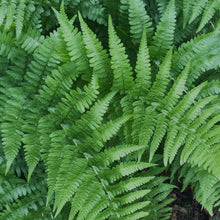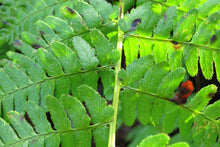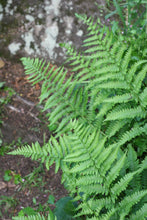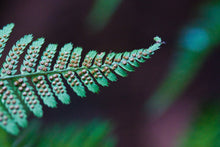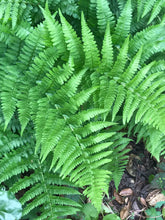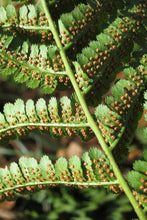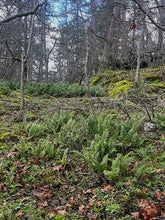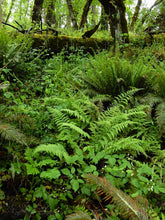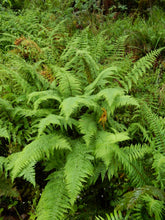
Dryopteris arguta
Wood fern, also called coastal wood fern, is a beautiful, semi-evergreen native fern that is both drought-tolerant and deer resistant, making it one of the most versatile ferns for a Pacific Northwest habitat garden. Its lovely ruffled foliage and dramatically tapered tips provide visual interest and structure, and can spread nicely to lusciously fill sparse woodland areas. It's also relatively uncommon in nurseries, making this a great find!
- Plant type/canopy layer: semi-evergreen, perennial, fern
- Size at maturity: up to 24" tall, 12"-36" wide
- Light requirements: full shade, part sun/part shade
- Moisture requirements: moist to dry soil
- Bloom time: n/a
- Growth rate/ease: medium growth rate, easy to grow
- Wildlife support: overall plant is a caterpillar host and larval food source for native moths, including the Orange Tortrix Moth
- Native habitat/range: common growing in open woodlands and shaded slopes, from sea level to 1600m, across the Pacific Northwest from southern California to British Columbia and southeast into Arizona. Portland Plant List - yes
- Special features & uses: deer resistant; drought tolerant; semi-evergreen; landscape uses include pollinator gardens, woodland gardens, slopes and border plantings, spreads to form a tall groundcover over time
Gardening with Wood Fern: This hardy fern would typically be found on shady north-facing slopes or in the dry-shady understory of upland trees. Though it prefers loamy soils, it can tolerate heavy clay and everything in between. It is “stress deciduous” meaning its frond will naturally die back when under stress, such as during peak summer drought, but will soon return when temperatures or other growing conditions improve. Wood fern will spread by underground runners, but not obnoxiously, creating a tall groundcover over time. It reproduces via visible sporangia, which are reproductive structures that hold the spores and are designed to collect a single raindrop where they germinate. Now isn't that magical.
Photo Credits 1 & 4: fronds - © Barbara Banfield, some rights reserved (CC-BY)
Photo Credits 2, 6-8: in the wild, population close, frond very close, frond underside lighter - © Ed Alverson, some rights reserved (CC-BY)
Photo Credit 3: Karli Del Biondo, Beetles and Bees
Photo Credit 5: frond underside dark - © Ken-ichi Ueda, some rights reserved (CC-BY)
Photo Credit 9: in the wild , blue sky - © Noah How, some rights reserved (CC-BY)









